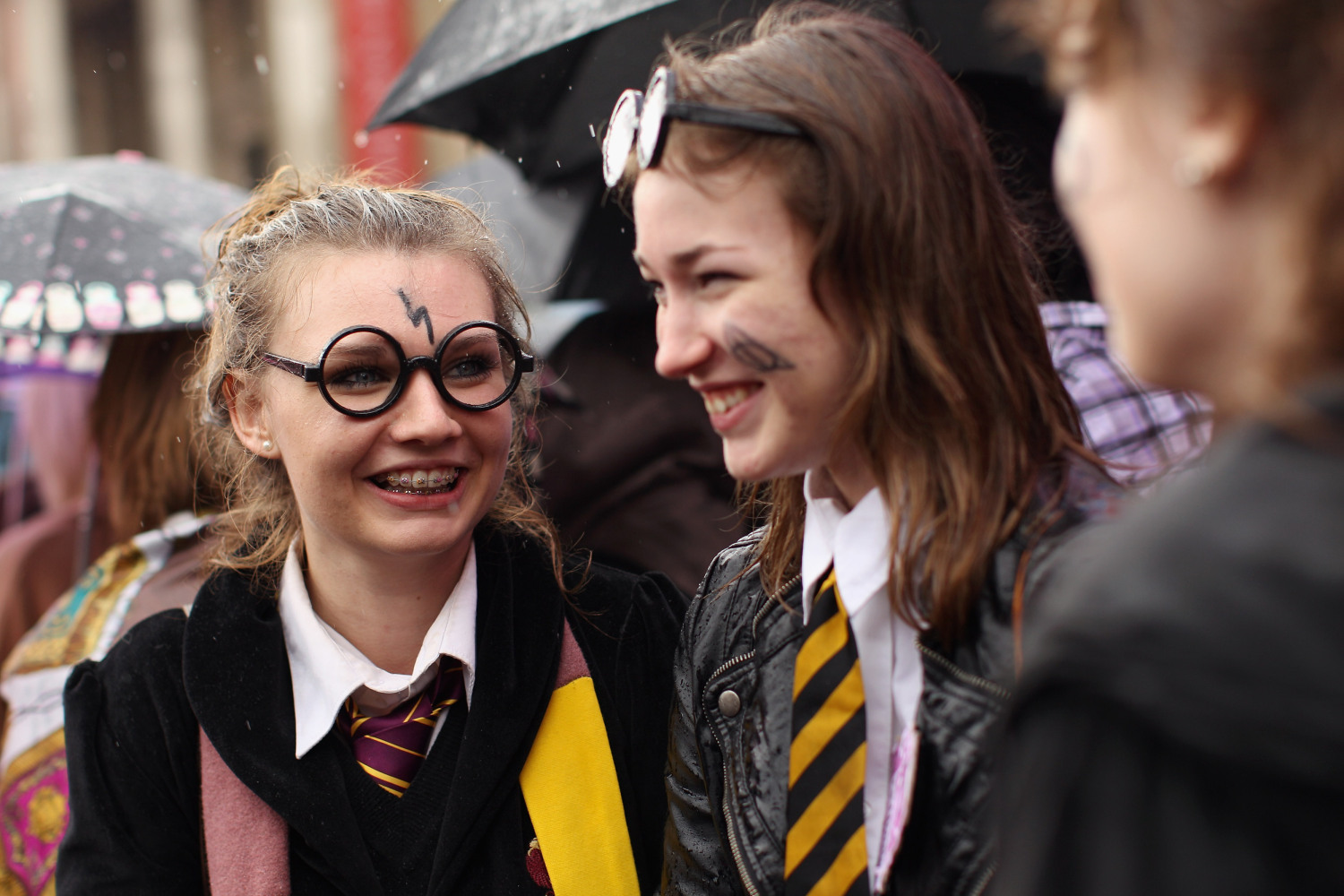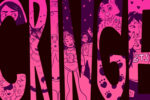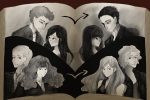On June 26, 1997, “Harry Potter and the Sorcerer’s Stone” was published, revolutionizing the world of literature for millions of children and adults alike. Even 21 years after its publication, the book still tops the charts as the fifth best-selling single-volume book of all time, with over 120 million sales.
Realizing the yet-untapped potential for the “Harry Potter” series, Warner Bros. bought the movie rights for the first several books from J.K. Rowling for around $2 million in 1999. The movie series allowed Rowling’s stories to expand far beyond her current audience to reach people of all ages and reading levels.
In honor of their beloved series, fans began to establish numerous events that allowed them to immerse themselves in the world of “Harry Potter” and Hogwarts: tea parties, yearly festivals and even Quidditch tournaments. These events gave life to the books and movies which brought fans joy and countless happy memories.
Unfortunately, in a manner distastefully similar to that of the loathed Dolores Umbridge, the muggles over at Warner Bros. have decided to put an end to these unsolicited Potter-themed events.
Although this behavior from Warner Bros. goes as far back as 2003, the company has really cracked down on its restrictions in the past year.
In a statement issued to the Associated Press, Warner Bros. said, “Warner Bros. is always pleased to learn of the enthusiasm of ‘Harry Potter’ fans, but we are concerned, and do object, when fan gatherings become a vehicle for unauthorized commercial activity.”
I’m sitting at the airport watching a news report on how they’re cracking down on Harry Potter themed festivals around the world because it’s illegal to have them if there isn’t commercial profit.. The world is fucking pathetic.
— Dubloadz (@Dubloadz) June 17, 2018
The most recent cease-and-desist debacle occurred earlier this month when Warner Bros. denied Chestnut Hill the ability to host its annual Harry Potter festival under that name. The yearly event, which featured attractions such as character meet-and-greets, a Fireball 5K and a Quidditch tournament, drew 50,000 “Harry Potter” fans to the Chestnut Hill business district last year.
“Harry Potter” fans around the world are outraged at Warner Bros.’ decision. Many have tagged J.K. Rowling in social media posts, begging her to help restore their beloved events. However, the author has not yet chosen to comment on the situation, and the issue might very well be out of her hands due to her contract with Warner Bros.
Is Warner Bros. within its legal rights to de-Potterize all these events and tear the enjoyment of a beloved classic from its fans? Unfortunately, yes. It does own the rights to the name, brand and world of “Harry Potter.” But is this the best decision Warner Bros. could make for the company and its revenue? Absolutely not.
Warner Bros.’ main concern seems to be that these festivals are pulling attendance from Universal Studios and its Wizarding World of Harry Potter. By shutting down all unauthorized commercial activity, the company hopes to drive fans to Universal to enjoy only the “Harry Potter” events that it deems worthy and personally profitable.
However, Warner Bros. is ignoring some very important points.
The “Potter” halt won’t prevent fan events.
These events will continue without the name of “Harry Potter.” People will still attend these now-generic wizarding festivals, despite the removal of the trademark name. It’s likely that “Harry Potter” fans will come dressed in their favorite memorabilia and enjoy some off-brand Butterbeer in a quiet move of rebellion.
The de-Potterization has not ended the activities, but rather it created thousands of frustrated fans.
The real problem for fans comes from the inability to immerse themselves in the world of the books as they have in the past. People will no longer be able to experience specific things like the Sorting Hat or meet their favorite characters without going to Universal Studios.
Obviously, Warner Bros. hopes that this specific problem will send the masses to its parks. But considering the notable outrage that these cease-and-desist orders have created in the past six months alone, Universal Studios might find itself facing a boycott rather than increased attendance.
Warner Bros. would still make money because of the festivals.
Warner Bros. needs to realize that it is not necessarily losing revenue from these events. If anything, it’s losing money by not supporting these kinds of festivals.
Yes, many of the festivals charge an attendance fee, and vendors sell themed food and items to visitors. However, many fans come with gear they’ve already purchased from licensed shops, and Warner Bros. can’t really claim rights to someone’s secret family recipe that might resemble food from a Hogwarts’ buffet.
As already mentioned, Warner Bros.’ biggest concern seems to be that people are attending unlicensed “Harry Potter” festivals instead of going to Universal Studios. But the reality is that avid fans are most likely going to attend both — if they can afford it.
At $115 for an adult and $110 for a child (under the age of 9), Universal Studios isn’t affordable for everyone. But the choice to attend a local festival for $15 or an expensive theme park across the globe isn’t the best comparison to base revenue on.
Warner Bros. will lose more than it will gain.
Warner Bros. doesn’t seem to realize that the Harry Potter events are actually free publicity. Events like these have kept the spirit of “Harry Potter” and Hogwarts alive during the gaps between books and movies. They give fans a reason to buy more licensed items and spread the word about their favorite series.
Making “Harry Potter” events generic will deprive fans of the ability to easily immerse themselves in the world of Hogwarts. Generic events will lower the hype for upcoming “Harry Potter” movies and might also hurt the chances for a continuously growing fan base.
For example, “Potter” lovers go to an event, bring a friend or two, share the magic and ta-da! — a new “Harry Potter” fan is born. Avid fans buy licensed gear to wear at the events and show their dedication, and the new fans often do the same once they’ve experienced the excitement. All of these purchases bring revenue to Warner Bros.
This is so upsetting. Our family absolutely loved Wizarding Weekend in Ithaca last year. Warner Brothers certainly makes enough money from the Harry Potter franchise without having to shut down these festivals (and stores and dinner parties…yes, even dinner parties!). https://t.co/fbQah5jy1y
— Celia (@CeliaBedelia) June 17, 2018
New fans are also likely to purchase the movies and books to experience the full magic of the wizarding world. Boom. More revenue for Warner Bros. Thus, the “Potter” empire expands without Warner Bros. lifting a finger in marketing.
A practical solution to this trademark problem would be for Warner Bros. to issue the necessary licenses or even sponsor these events. This would give Warner Bros. a valid claim to the money that comes from themed food, merchandise and attractions. It would also make fans happy, bring Warner Bros. additional revenue around the world and be an overall profitable compromise for everyone.
Fans are more likely to buy items at or in anticipation of some sort of big event. Because attending Universal Studios isn’t always a possible option, Warner Bros. should bring the business to where the people are. Plus, many of these events are already well established, so the hassle for the company would be minimal.
Sadly, Warner Bros.’ current stance is that festivals can bear the “Harry Potter” brand only with a valid license, which the company (conveniently) isn’t giving out at this time. This stubborn decision leaves the fans and the festivals without many options to enjoy the world that they’ve claimed as an imaginary home.
Time will tell whether or not Warner Bros.’ crackdown will be worth the fuss. For now, “Harry Potter” fans will have to settle for generic wizarding events or find the funds for a trip to Universal Studios.
















